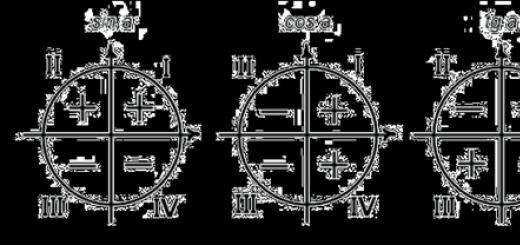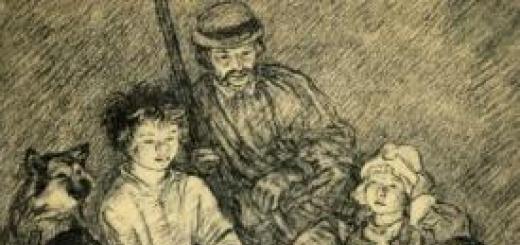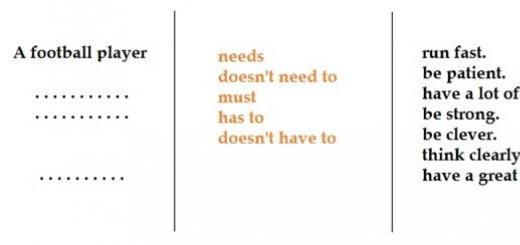During the Second World War, the Nazis killed at least one and a half million people in the death camp alone - Auschwitz. Can we at least to some extent justify this crime against humanity by citing the fact that atrocities are necessary to give meaning to goodness, to highlight and exalt it?!
If we evaluate these statements in the coordinates “smart-stupid” (quality of thinking), then we must admit that all of them - maybe the biggest stupidity said by philosophers. To consider evil necessary for good (or for progress) means to justify and sanctify it (accordingly, to justify all criminals and villains), to consider all the efforts of people to combat evil unnecessary and in vain. There cannot be two truths here: that (1) evil is necessary for good and that (2) evil must be fought. If we recognize evil as necessary for good, then we should not fight it. If we recognize the need to fight evil, then we should not consider it necessary for good. One excludes the other. Otherwise, we are dealing with a logically contradictory statement. (In fact, the statement that evil is necessary for good contains an implicit logical contradiction, because the very concepts of “good” and “evil” characterize the good, the good, the useful, the desirable, the necessary, on the one hand, and then what is not good, useful, desirable, necessary, on the other hand. If evil is necessary for good, then it is necessary for man, and if it is necessary for man, then it is good. Thus, evil is good: not-A is equal. A).
12. The stupidity of the philosopher as a gross error of categorical thinking
In the past, philosophers and historians often explained important historical events and turns as the result of random, insignificant causes. C. Helvetius, in his essay “On Man,” wrote: “As doctors assure, the increased acidity of the seminal substance was the cause of Henry VIII’s irresistible attraction to women. Thus, England owed this acidity for the destruction of Catholicism” (C. Helvetius. Op. Vol. 2 , M., 1974. P. 33). It seemed to Helvetius that England owed the destruction of Catholicism to the personal characteristics of King Henry VIII. He was referring to the marriage of the English king to Anne Boleyn, which caused a break with the Pope. In reality, this marriage was used only as a pretext for breaking with Rome. Randomness, of course, played a certain role here. But behind it stood the historical necessity of reformation. Helvetius exaggerated the role of insignificant chance, elevated it to the rank of necessity, that is, he mistook necessity for chance.
13. The stupidity of the philosopher as a result of superficiality, frivolity
Among philosophers one can often find Khlestakov’s “extraordinary ease of thought.” F. Nietzsche was distinguished by such ease of thought. He said a lot of stupid things. Here are some of them:
13.1. " Are you going to women? Don't forget the whip!"Thus spoke Zarathustra." - No comments needed.
13.2. From Nietzsche comes the expression " push the falling one" (“What falls, you still need to push!” - “Thus spoke Zarathustra.” Part 3 (Nietzsche F. Works. In 2 vols. T. 2. M., 1990. P. 151)). If If a person is weak in some way, then there is no need to help him, but, on the contrary, we need to contribute to his further downfall. There is probably no more cynical statement in the mouth of a philosopher!
13.3. " Morality is the importance of man before nature" I heard this “aphorism” of Nietzsche, if I may say so, on the radio before the news program “Vesti” (9.59) on Sunday, April 27, 2003, in the section “Complete collection of revelations” of Radio Russia. What can one say to this? The stupidity of the philosopher knows no bounds ; is dangerous because it is repeated a million times by other people, it spreads like a viral infection, like a contagion. Think about these words of Nietzsche. If morality is self-importance, then, therefore, down with morality, goodness, honor, duty - all this is self-importance of a person. nature, i.e. something unworthy, which must be gotten rid of. See also paragraph 20 (Nietzsche on conscience).
13.4. Here is another stupidity of F. Nietzsche. Without being at all embarrassed, he attributes to philosophers a negative attitude towards married life: “... the philosopher shies away married life and everything that could seduce him towards her - married life, as an obstacle and a fatal misfortune on his path to the optimum... A married philosopher is appropriate in comedy, this is my canon"("Towards the Genealogy of Morals"). He clearly passes off wishful thinking. Socrates, Aristotle, F. Bacon, Hegel and many other philosophers were married. Nietzsche has great conceit: very often he passes off his subjective specific view as a generally accepted opinion.
13.5. F. Nietzsche said so many stupid things that they exceed the critical mass and make him a false philosopher, a false sage. His " Evil wisdom"(the title of one of the books) is the height of absurdity. Think about this title. It is monstrously absurd, like a round square or hot snow. Wisdom, in principle, cannot be evil. It is the focus and unification of the three fundamental values of life - goodness, beauty, truth. From such a combination, their strength increases many times over. The newfangled word “synergy” is the best fit for wisdom. It is not alone, nor truth, nor goodness, nor beauty. It is what leads or can lead to truth, goodness and beauty. which is a prerequisite or condition for truth, goodness and beauty. Wisdom is the greater wisdom, the better it leads to good and the better it protects from evil, since evil is anti-good.
Nietzsche said to himself that he was an “adventurer of the spirit.” Indeed, his mind is going crazy. Goethe said: where stupidity is a model, there reason is madness. The opposite is also true: where reason is madness, there stupidity is a model (let us remember holy fools of various stripes and how they were revered).
14. K. Castaneda - accusing all people of stupidity
K. Castaneda: “ The warrior treats the world as an endless mystery, and what people do as endless stupidity"("The Teachings of Don Juan", p. 395). The incredible stupidity of a philosopher is to accuse all people of stupidity.
15. K. Marx: the essence of man is the totality of all social relations
K. Marx: "...the essence of man is not an abstraction inherent in an individual. In its reality, it is the totality of all social relations." - Marx K., Engels F. Op. T. 3. P. 3.
The methodological misconception arose due to the fact that psychologists shifted the attention of educational researchers from the study of the social (student, pupil) to the study of natural phenomena (the human psyche, child). Thus, psychologists, wittingly or unwittingly, replaced the social subject of research with a natural subject, thereby closing the path to the study of social phenomena in pedagogy.
First of all, let us pay attention to the incorrect use by psychologists of the philosophical concepts of “personality” and “man,” and then by teachers who considered psychology the foundation of their science. So, for example, S. L. Rubinstein says that “the essence of personality is the totality of social relations.” At the same time, he refers to K. Marx. Turning to the indicated source, we find that he speaks not about the essence of personality, but about the essence of man: “...The essence of man is not an abstract inherent in an individual. In its reality, it is the totality of all social relations."
It is absolutely clear that the expressions “essence of personality” and “essence of man” do not constitute an identity, but K. Marx does not emphasize this; he focuses on the fact that the essence of man does not belong to an individual. The fact is that for social relations to arise, there must be at least two interacting subjects. Therefore, these relationships are not inherent to the individual. They are not inherent in one individual because the entire set of social relations cannot be embodied and manifested in such a short life of an individual.
K. Marx, speaking about man, does not mean natural man, but man as the unity of the natural and social, but his emphasis is on the public (social) side of man. This is emphasized by him in the following thesis, which states that in Feuerbach “the human essence can only be considered as a “genus”, as an internal, silent universality, connecting many individuals only natural bonds." That is, K. Marx distances himself from the essence that connects many individuals only by natural ties, but does not reject it, but only points to the presence of a social essence of man.
Thus, in order not to confuse a person as an integral being with one of his sides - social - it seems convenient to us to designate this side with another word - “personality” - and then we will not have the desire or desire to turn a person into a person. This was actually already presented by Marx. He noted in “A Critique of Hegel’s Philosophy of Right” that “... the essence of a “special personality” is not her beard, not her blood, not her abstract physical nature, but her social quality, and that state functions, etc., are nothing more than ways of existing and operating the social qualities of man. It is clear, therefore, that individuals, insofar as they are bearers of state functions and powers, should be considered according to their social, and not according to their private quality." That is, if we accept and assign to the word “personality” the meaning of the social side of a person, then the content of the expression “consider a person as a person” should be identical to the content of the expression “consider a person by social quality.” It is in this sense that we will use the term “personality,” without allowing it to be used in the meaning of man as a unity of a natural and social being.
Of course, personality as the social side of a person has neither blood nor beard; these qualities (signs) belong to man as a natural being. In the concept of personality we include only the content of a person’s social qualities. Personality is a personalized part (side) of social functions, social qualities of a person and social relationships. With this understanding, there is no reason to confuse a person with a personality.
Psychologists record the existing difference between personality and man, but further in their reasoning they reject it. Although, for example, the very expression “human personality,” used by S. L. Rubinstein, allows us to separate personality from man: since this is the personality of a person, it means that the person has a personality, which means that a person may not have a personality, which means that a person is not a personality. But such a consequence from the statement does not become the subject of S. L. Rubinstein’s thought; he ignores it, since he has already determined for himself that a person is a person: “Human personality, that is, that objective reality that is denoted by the concept of personality, is “, after all, a real individual, a living, active person.” This judgment confuses the matter even more, since it speaks of a human personality and at the same time, implicitly, assumes the existence of a personality that is not human. First, S. L. Rubinstein says that “the human personality is a personality,” then he says that “personality is a real, living person.” But if a person is a real living person, then there is no point in talking about the personality of such a person; it is enough to simply talk about the person.
The unresolved problem of man - personality makes itself felt in his other statements, but he, as if without noticing this, continues to develop his position of identity of man and personality. “A person’s personality,” he writes, “of course, cannot be directly identified with its social – legal or economic – function. Thus, not only a person as an individual, as a person, can be a legal entity. At the same time, a person (individual, personality) may not act as a legal entity, and, in any case, is never only a legal entity - a personified legal function. Similarly, - Rubinstein continues, - in political economy, Marx, speaking about the “characteristic economic masks of persons”, that “this is only the personification of economic relations, as the bearers of which these persons oppose each other,” after this he notes the inappropriateness of considering persons only as personalized social categories rather than as individuals. “...We got into difficulty,” writes Marx, “due to the fact that we considered persons only as personalized categories, and not individually” (vol. 23, p. 173).”
The meaning of this statement, in our opinion, is S. L. Rubinstein’s desire to convince himself and the community of psychologists that he and K. Marx equally consider it unlawful to consider faces (people) only as personalized social categories. But this is far away or, more precisely, not at all true. Firstly, in fact, K. Marx states the opposite: “Persons exist here for each other only as representatives of goods, that is, as commodity owners. In the course of the study, we will generally see that the characteristic economic masks of persons are only the personification of economic relations, as carriers of which these persons oppose each other.” For some reason, S. L. Rubinstein ignores K. Marx’s statements that he does not consider faces as such, but only economic masks of faces. Secondly, the term “illegality” used by S. L. Rubinstein is absent from the pages of “Capital” indicated by him. Only S.L. speaks about illegality. Rubishtein. Thirdly, the principle of analysis of social phenomena developed by K. Marx led him to the discovery of the essence of the main economic phenomenon - value. Therefore, K. Marx, defining the essence of man as a set of social relations, argues that the individual (man) should be “considered according to his social, and not private quality.” And such an approach is objectively necessary if we want to establish the essence of social phenomena.
If Rubinstein means that throughout his entire life a person cannot be only a legal function, then there is no objection: this is the truth. But if he believes that a person cannot be a legal function at all, then here one can object to him. In order to correctly perform this or that particular legal matter (action), a person must for this time become precisely and only a legal function, or more precisely, become a subject of legal activity. If this does not happen, then the legal matter will not be completed.
Based on the above meaning of the concept of “personality” - the social side of a person - it can be argued that personality can be identified with the social, with one or another social function, because “personality” as a concept represents the social, but identifying a person with the social would be elementary logical error. This may have almost empirical confirmation, since the natural in man, of course, is not social. It is for this reason that a person (a socially educated person), as a unity of the natural and the social, can never form an identity only with the social (social), or only with the natural (natural).
Thus, the statement that a person “is never only a legal entity - a personified legal function” is both true (if only because a person is both a natural and a social being at the same time) and false (erroneous). If you do not become “only a legal entity” (the subject of legal relations), then no legal relations and functions in society can even appear.
A person at a certain moment can be identical to one or another social function, becoming the subject of its implementation. Thanks to his natural and social qualities, a person has the opportunity to properly perform social functions, while holding back the manifestation of his natural and personal qualities that currently impede the performance of one or another function. Since this is the case, society exists and functions as a civilized society of socially educated people.
Now we turn to the part of S. L. Rubinstein’s statement where he claims that the author of Capital, K. Marx, found himself in a difficult situation precisely because he considered economic facial masks only as social categories.
From the statement of K. Marx cited by Rubinstein, a simple conclusion follows: in order not to get into a difficult situation, it is necessary to consider persons as individuals (individually) - this is Rubinstein’s point of view. Reinforcing this position with the authority of K. Marx, Rubinstein contributed to its spread in pedagogy, and even today teachers continue to consider pedagogical “face masks” - teacher, educator, student and pupil - individually, as real people, which is an obstacle to the development of the theory of pedagogy .
Before turning to the pages of “Capital” indicated by S. L. Rubinstein (vol. 23, p. 173), let us recall that on them K. Marx analyzed the provisions and statements of economists who tried to substantiate that surplus value is formed or created in the sphere appeals. To clarify this issue, K. Marx considered the buyer, seller, commodity owner, manufacturer, consumer, etc. only as personalized categories representing social economic relations. Summing up the preliminary results of his analysis, K. Marx comes to the conclusion that in the sphere of circulation surplus value is not formed and is not produced. And thereby came into conflict with economists who believed that surplus value is formed in the sphere of circulation. This allowed Marx to suggest: “Perhaps we have got into a difficulty due to the fact that we considered persons only as personalized categories, and not individually.”
And then K. Marx moves on to consider the assumption made, identifies specific individual qualities among commodity owners engaged in commodity exchange, and demonstrates that these qualities participating in the exchange do not increase surplus value. He gives the following reasoning: “Commodity owner A can be such a clever swindler that he always deceives his colleagues B and C, while these latter, with all their desire, are not able to take revenge. A sells B wine worth 40l. Art. and through exchange acquires wheat worth 50 pounds sterling... Let's take a closer look at the matter. Before the exchange there were 40 pounds. Art. wine in the hands of A and 50l. Art. wheat in the hands of B, and the total value of 90 pounds sterling. After the exchange we have the same total value of £90. The value in circulation has not increased by a single atom; only its distribution between A and B has changed.” And further: “No matter how you spin it, the fact remains: if equivalents are exchanged, then no surplus value arises, and if non-equivalents are exchanged, no surplus value arises either.” So, it can be noted that individual qualities (dexterity and trickery in person A) and other individual qualities available to the bearer of economic relations do not produce or increase surplus value. But economic relations, presented in theory as personalized categories, presuppose the independent existence of both the bearer (person) of these or other social relations and the actual relations. The personified social quality is not the person itself.
K. Marx is categorical, he does not allow the possibility of interpreting his position differently and says: “We will therefore keep within the boundaries of commodity exchange, where the seller is the buyer and the buyer is the seller.” That is, he adheres to the social (economic) functions of the seller and buyer, and not to the individual trickery, cunning or other qualities of individuals.
A glance at the pages of Capital indicated by S. L. Rubinstein reveals that K. Marx did not find himself in any difficulty. He says: “Perhaps we are in trouble...” By the will of S. L. Rubinstein, who omitted the words “perhaps”, indicating the modality of the statement, it turned out that K. Marx says: “We are in difficulty.” Whether this was done intentionally or by misunderstanding does not matter, but it radically changes the attitude towards the position of S. L. Rubinstein. The fact is that S. L. Rubinstein needed serious support for his psychological position, which claimed to study social phenomena. But, strange as it may seem, he actually contradicted the position of K. Marx, who in economic theory considered persons as personified categories of economic relations and did not touch upon the issue of studying a person as an individual, did not attach serious importance to the individual qualities of a person in economic theory, if these qualities had no economic content. For K. Marx, a person (person) participating in the economic sphere is a subject of corresponding activity expressing economic relations. That is why he calls a person a buyer, seller, worker or capitalist - names that represent precisely economic relations.
Consequently, a person (person) who has become a participant in the pedagogical sphere, under appropriate conditions, is a subject of activity expressing pedagogical relations. That is why a person is called a teacher, a student or an educator and a pupil - names that represent precisely pedagogical relationships. For S. L. Rubinstein, a person is both a personality, an individual, and a real living person, and all of them (these phenomena), according to Rubinstein, have a psyche, which is the subject of psychology, although in reality only a person has a psyche. In this case, Rubinstein does not see and does not define the social facets of a person, or deliberately ignores the social as something not essential in his position, due to which a person for him finds himself outside of society, as something that has only a psyche.
K. Marx shows that considering “persons only as personalized categories,” that is, as social (economic) phenomena, and not as natural ones, makes it possible to establish the actual causes and conditions for the formation or creation of surplus value. Despite this, S. L. Rubinstein, with the help of a figure of silence (indicated above), turns K. Marx into a supporter of his psychological position.
An attempt to even assume that the essence of social, including economic, phenomena can be revealed by considering individuals individually, that is, by considering the mental characteristics (properties and qualities) of a real natural person with a psyche, is not constructive. However, the assumption of the presence of a psyche in economic relations (phenomena) becomes the basis for the intervention of psychology in social phenomena.
S. L. Rubinstein and his followers cannot admit in any way that personality is not a person, that personality does not have a psyche, that personality is a concept that represents only the social side of a person. This is where the confusion (failure to distinguish between social and mental, natural phenomena) occurs in psychology. A similar confusion occurs in pedagogy, since psychology is considered the foundation of pedagogy and traditionally continues to follow many of the attitudes of psychologists, including the attitude of considering the teacher and student as individuals. This misconception hinders the development of the theory of pedagogy and does not allow pedagogy to be recognized as a science.
The methodological position of K. Marx - individuals performing state functions must be considered according to social, and not individual quality - actually denies the claims of psychology to a leading role in explaining social phenomena, including pedagogical ones. Psychologists either did not understand the essence of this position, or understood it, but in order to maintain the status quo of psychology as the foundation of pedagogy, they decided to bring K. Marx to their side. Whether this is true or not, there is an attempt to show that Marx admitted that the methodology he developed for analyzing social phenomena without resorting to psychology (to the characteristics of the individual) is erroneous.
A step towards solving the problem of subjects, which has already been accomplished in pedagogy, in our opinion, is the recognition of the student and pupil not as objects of pedagogical influences (educational and educational), as it was, but as subjects. It should be noted here that awareness of the problem of the subject of the teacher and the subject of the student did not lead researchers to pose the problem of the subject of the educator and the subject of the pupil. The inertia of the pedagogical tradition, in which the teacher and educator as pupil and student are not sufficiently different, does not allow researchers to correctly differentiate between them. This hinders the development of the science of pedagogy and its theory.
Thus, traditional pedagogy stops at the need to distinguish between social and non-social phenomena, to distinguish pedagogical phenomena from natural ones as carriers of social phenomena.
See this text: Part two. FUNDAMENTALS OF THE THEORY OF PEDAGOGY. Chapter 4. Mental, social, pedagogical, where the incorrect use by psychologists of the concept of personality was pointed out.
Human- the highest stage of evolution of living things, the object and subject of socio-historical activity and culture.
Philosophical anthropology– a section of philosophical knowledge devoted to a comprehensive consideration of the problem of man.
Essence– expresses the main thing that characterizes objects, phenomena, systems, from the inner, most important, deep sacredness.
The set of features and characteristics that distinguish it from other living beings is called human nature. The main quality of a person, his “deep core” is called the essence of a person. Let's consider some essential definitions of a person.
Social animal. This is what the ancient Greek philosopher Aristotle (384-322 BC) called a person, who believed that a person realizes his essence only in social life, entering into economic, political, cultural relations with other people. Moreover, not only a person is a product of society, but also society is a product of human activity.
A reasonable man. This definition also goes back to Aristotle. Man, in his opinion, is distinguished from the animal kingdom by his ability to think logically, to be aware of himself, his needs and the world around him. After the advent of the biological classification, Homo sapiens became the standard designation for modern humans.
A creative person. An animal creates something in accordance with a program given by instinct (for example, a spider weaves a web), and a person is able to create something completely new according to programs created by himself. A person actively produces, creates, and his activity is purposeful and has a value meaning. In this understanding, man became a man when he made the first tool.
Man playing. Not a single type of cultural activity can do without gaming components - justice, war, philosophy, art, etc. Not only work made a person human, but also free play time, where he could realize fantasies, develop imagination, create artistic values, communicate, and voluntarily accept general rules.
A religious man. A person has the ability to give sacred meaning to surrounding phenomena, endow them with special meaning, and believe in the supernatural. All known societies, including the most primitive ones, have belief systems of one kind or another.
15. The problem of the cognizability of the world. The unity of sensory and rational knowledge.
Cognition– the process of purposeful active reflection of reality in the human mind. The science of knowledge is epistemology.
Subject of knowledge- the one who carries out the process of cognition. An individual or a collective can act as a subject of cognition, but in the broadest sense of the word, the subject of cognition is society as a whole, since it is it that stores the knowledge acquired by different people and groups and passes it on to subsequent generations - the subjects of the cognitive process of the future.
Object of knowledge- this is what the cognitive activity of the subject is aimed at. In the most general understanding, the object of cognition is the world around a person, but in reality this is that part of the world with which the subject of cognition has entered into practical-cognitive relations. In different eras, certain objects and phenomena become objects of knowledge. (Elementary particles, for example, have always existed, but became objects of study only in the twentieth century). Moreover, the objects of knowledge can be not only material, but also ideal objects (mental models and theoretical concepts created by man to study real phenomena). The results of knowledge are ideas, scientific theories, scientific facts, etc. can also become objects of knowledge.
The concepts of “subject” and “object” of cognition are correlative, since the individual, the collective, and society as a whole are not only subjects of cognition, but can act as objects of cognition (and self-knowledge).
The result of cognition is knowledge.
Knowledge- not all the information coming from the subject to the object, but only that part of it that is transformed and processed by the subject, i.e. information about the object must acquire meaning and meaning in the subject. Knowledge is always information, but not all information is knowledge!
Information– a special way of interaction between a subject and an object, through which changes are transferred from the object to the subject.
Basic methods of knowledge of natural sciences:
-explanation– a transition from more general knowledge to more specific ones, as a result of which deeper and stronger connections are established between different knowledge systems.
-understanding– a process consisting of repeated processing and transformation of information. Understanding procedures:
-interpretation(initially attributing information to a certain meaning and meaning)
-reinterpretation(clarification of the meaning or this or that information)
-convergence(the process of combining different semantic meanings of this or that information)
Sensory and rational cognition.
1) Sensual- ability to perceive through the senses
Forms of sensory knowledge:
-feeling(reflection of individual properties, individual characteristics of objects and processes. Types of sensations: visual, auditory, tactile, olfactory)
-perception(a holistic image of an object affecting the senses, but perception is not a simple sum of sensations, but their synthesis)
Representation (an image of an object formed without direct contact of the senses with this object. Memory or imagination is used to form an idea)
2)Rational– a way of reflecting reality through logical thinking.
When characterizing rational knowledge in modern science, it is customary to distinguish between the concepts of “thinking” and “intelligence”. Intelligence is considered as the ability to think (mental ability). By thinking (mental activity), on the contrary, we mean that specific activity that is carried out by the bearer of intelligence. Intelligence and thinking are not isolated forms of cognition; in the process of cognition, there is a constant relationship between them.
Levels of thinking:
1-reason (the level at which the handling of abstractions occurs within a rigid standard, considering concepts and objects as unchanging and constant)
2-reason (dialectical thinking, which is characterized by creative manipulation of abstractions, comprehension of the essence of things in their development)
Forms of rational knowledge:
-concept(a thought about an object that reproduces its essential properties and characteristics. A concept has content and scope. Content– what is thought of in one concept or another, for example, sweet, white, soluble in water, in total form the concept of sugar. Volume- something that is thought through a concept or is a sum, class or group of species to which this concept can be attributed, for example, the scope of the concept animals - birds, fish, humans - a set of classes. A concept with a larger volume to a concept with a smaller volume will be considered a genus, and vice versa - a species)
Types of concepts: general(belong to specific classes of objects - planets, chemical elements), single(refers to single objects - planet Earth, iron, copper), collective(denote a whole consisting of homogeneous parts - bouquet, library), specific(denote specific things, objects), relative(concepts that presuppose the presence of other concepts associated with them - good and evil, life and death), absolute(exist independently and independently of other concepts - law, color)
-reasoning(through the connection of concepts, something is confirmed or denied)
Types of judgments: analytical (are of an explanatory nature, without conveying new knowledge about the subject, for example, every bachelor is unmarried), synthetic (extended knowledge about the subject, giving new information, for example, all bodies have heaviness), a priori synthetic (extended knowledge about subject that does not require experimental confirmation, for example, man is mortal, the world has a beginning)
The subject (what is being said), the predicate (what is being said) and the connective of them - the table (subject) is (the connective) wooden (predicate)
-inference(reasoning during which a new one is derived from 1 or several propositions)
Types of inferences: inductive (from the particular to the general, e.g. the words milk, house, library - nouns), deductive (from the general to the particular, e.g. all people are mortal, Socrates is a man, then Socrates is mortal), inference according to analogy (based on a comparison of 2 objects, a conclusion is drawn about the similarity of objects by analogy, for example, object A has characteristics a, b, c, object B has characteristics a, b, c, object A has characteristic D, probably object B also has characteristic D)
Basic epistemological concepts:
1) Empiricism– an epistemological concept according to which the only source of reliable knowledge is experience(founder Bacon)
2) Sensationalism– an epistemological concept according to which the only source of reliable knowledge is sensations(Protagoras, Hobbes, Locke, Hume) J. Locke: “There is nothing in the mind that was not first in the senses”
3) Rationalism- epistemological concept, according to which the only source of reliable knowledge is mind (thinking)(Descartes - founder, Plato, Spinoza, Leibniz, Hegel) Leibniz: “There is nothing in the mind that was not previously in the senses, except the mind itself.”
4) Apriorism- an epistemological concept that recognizes the existence of knowledge that is not based on optic knowledge and does not depend on it (Descartes, Kant)
5) Intuitionism– an epistemological concept that recognizes intuition the main means of cognition. Bacon – contrast between intuition and intellect, Lossky – intuition and intellect are identified. He identified 3 types of intuition: sensual, intellectual, mystical.
In solving the problem: “is the world knowable?” Generally, two main positions are distinguished:
1. Epistemological optimism (Gnosticism)- a person has sufficient means to understand the world around him. It is characterized by faith in the knowability of not only phenomena, but also the essence of objects (Democritus, Plato, Aristotle, F. Aquinas, Bacon, Descartes, Hegel, Marx)
2. Agnosticism- a theory of knowledge that believes it is fundamentally impossible to know objective reality. The world is unknowable, the human mind is limited and cannot know anything outside of sensations.
Kant's theory of agnosticism:
Man himself has limited cognitive capabilities due to the limited cognitive capabilities of the mind.
The surrounding world itself is unknowable in principle - a person will be able to understand the external side of objects and phenomena, but will never know the inner essence of these objects and phenomena.
Varieties of agnosticism are: skepticism, relativism, irrationalism, religious revelation, etc.
-Skeptics doubt the possibility or effectiveness of any specific cognitive processes, but do not deny a person’s ability to know.
-Relativists they defend the relative nature of the correspondence of knowledge to the object of knowledge, they believe that true knowledge that could be trusted does not exist.
-Irrationalism inherent in religious philosophy, mysticism, existentialism and a number of other philosophical teachings. In them, it is considered as the leading, transrational level and way of comprehending being; or as a way of comprehending only the divine, secret, ideal; or as a necessary addition to sensory and rational knowledge.
What is the essence of man or what is man? Each of us already has some understanding of the essence of man, but it never hurts to think about it again. From how we understand essence of man, the direction of our own growth and development (or degradation), and our approach to raising children, and relationships with other people depend... Some options direct us to the fullest realization of our potential, while others, on the contrary, close many prospects.
We are all people, but people can be very different: bad and good, smart and stupid, vile and noble, talented and mediocre... How can the essence of a person be revealed among this diversity? There are a lot of people who are unhappy, dissatisfied with life, lost... And others are happy, successful, purposeful. Why? Of course, everyone is unique, but can all of our qualities be classified as unique characteristics? Are they sometimes just developmental delays or illnesses? And how to find out? There must be some kind of frame of reference that gives a certain standard of human essence. Our conclusions will depend on the system in which we think.
The essence of man as his potential
By the essence of a person, I, first of all, mean his potential - that a person Maybe implement in life. Or it may not be implemented. For example, an infant can potentially learn to talk and walk. But if he does not learn this, then this potential will not be realized. With children, however, everything is clear. We have tables that tell us what a child should master and at what age during normal development. We will not discuss the degree of adequacy of such tables - at least they exist.
It's more difficult with adults. There are no tables for them, but the huge difference between people suggests that not everyone has fully demonstrated their human essence, achieved personal maturity, or realized their potential. Our trouble is that human essence is not at all obvious; it does not reveal itself and is not realized. The possibility of this implementation largely depends directly on the person himself - on how he understands this task, and his efforts. And the main question is what is considered human potential?
For example, a kitten will grow into a cat, and a rose sprout will grow into a rose bush, in any case, without any effort from oneself or from outside. If the conditions are bad, then the cat or rose may be weak, sick, but their essence will not change from this. But a person does not always even realize his potential. And this can happen only because he understands his essence in such a way that he does not take into account many of the possibilities of this potential. These opportunities have not gone away, but people do not develop them. As a result, an internal conflict arises, which stealthily ruins his life. But he can’t understand what’s the matter...
Options for understanding the essence of man
There are not many options for understanding the essence of a person. All concepts of the essence of man can be divided into 4: man is an animal, man is a part of nature, man is a product / part of society, and man is something more, irreducible to everything else, a unique being. Human development is determined, accordingly, based on an understanding of its essence.
Man is an animal
The materialistic concept of the essence of man defines man as “a representative of the species people from the family of hominids of the primate order,” i.e., as one of the animals. There is practically no talk here about the specific essence of a person and any special potential - a person belongs to his species by birth. Like an animal, his capabilities are not great, even taking into account his intelligence. As a child, he masters the skills of speech, walking upright, using his hands and mind to perform simple survival operations. Well, that’s all :) After all, here a person is, first of all, a body, a biological organism. It is determined by the needs of the body.
If a person is only a biological being, an animal possessing purely technical intelligence, then his development is interpreted as physical development plus the mastery of a certain minimum amount of knowledge and skills achieved by humanity. There is no talk of individuality here. The task of development of such a person is adaptation to environmental conditions and preservation of the species. The main activity of man as an animal is the production of offspring and teaching them the skills necessary for survival. Like an animal, he has virtually no freedom. With all the consequences that follow from this...
Man is part of nature
This view of the essence of man is shared by various people who talk about “harmony with nature.” They view a person solely as part of nature, which, in fact, differ little from materialism. Even though they see “nature” more broadly than materialistic philosophy, seeing in it, in addition to the visible, also invisible “levels” of varying degrees of fantasticality. This does not change the essence - after all, the secret of the universe is that it is all one, everything is just different forms of existence of one energy, this energy is simply “subtle” and “gross”.
They speak beautifully about the essence of man - that it is “divine.” We just need to find this god within ourselves and identify with it. However, it turns out that everything in the world has the same “divine essence”. This philosophy does not make a difference even between living and inanimate nature - not only animals, but also a stone along the road have the same divine essence. The task of man in these teachings is to merge with nature, which means the entire material world, as fully and harmoniously as possible. This is even more radical than considering yourself an animal...
How to merge with nature? This means getting rid of everything that interferes on this path - and self-consciousness and reason interfere, desires interfere, will too... What potential can we unlock with such an understanding of the essence of man? It’s difficult to even say what kind of potential the stone has. But it is obvious that with such a view, many human traits are abolished as completely unnecessary (more on this in the article). And certainly there can be no talk of any uniqueness or individuality. You're just part of nature! Even relationships with other people in this system appear as a mechanical interaction of impersonal “energies” that they conduct through themselves. Nothing personal, in general - just physics :)
Man is a social animal
Everyone knows that if Mowgli is raised outside of human society, then he will not become a full-fledged person - he will not even learn to walk and talk. This means that interaction with one’s own kind is very important for becoming a human being. That is, a person is social animal. This view assumes that the full potential of a person depends on society, and it is there that it is realized. In this case, the development of the individual will consist in the best adaptation to society - that is, in socialization. This is the acquisition of knowledge, skills and character traits necessary to interact with society according to its laws. I learned the laws, learned to apply them - and that’s it! What will be the criterion for development here? That's right - success and respect in society.
In our consumer society, success is measured in terms of money and property, as well as steps on the career ladder. Successful playing of social roles is also important: citizen, man or woman, family member (). This is a very characteristic idea of a person for our society. But roles and place in society are only external aspects of our existence. But what about the internal ones? And what about realizing our uniqueness?
Man is a unique creature
When we talk about the essence of something, we try to find features that distinguish it, and are not common to something else. It seems to me that in order to determine the essence of a person, it is advisable to highlight those features that distinguish him from the rest of the world - after all, this will be his species uniqueness, Right? The view of the essence of man as a being that is fundamentally different from the rest of the world is shared by philosophy/psychology of the humanistic direction and some world religions.
In religion, what distinguishes a person from the rest of the world (animals, plants, inanimate nature) is called in spirit. The spirit is fundamentally not related to the “other world”, “to this world”, being the “image of God” or the “spark” of the transcendental God. Non-theistic humanism simply considers man a unique being, capable of self-creation and creativity, a subject of cognition and activity, relying in his actions on his own mind and creative potential, which is not observed in the rest of nature.
Distinctive features of man as a unique being
- Free will. The rest of the world is governed by laws and instincts, but man is capable of voluntary behavior. Responsibility also follows from this.
- Intelligence. Only a person is capable of thinking and comprehending himself and his surroundings. Animals can think and understand something, but questions of meaning interest only us, only we are capable of reflection and abstract thinking.
- Creation. Only man creates new things, like God. The rest of the world simply exists, adapting and using the environment.
- Development. A person has an innate desire for self-improvement and personal development that continues throughout his life.
- You can also note religiosity, an aesthetic sense and a sense of humor - this is also not observed in the animal world.
Based on these human properties, values such as truth, goodness and beauty exist in the human world. And on these traits is based the possibility of originality, uniqueness - her moral choice, independent thinking, creative self-expression, the ability to love. I think everyone will agree that these traits distinguish only a person and are potentially present in each of us, as well as the fact that in reality not everyone realizes them to the fullest.
Understanding the essence of man as a moral choice
Unfortunately, we can observe people who do not use their freedom, but act under the influence of external factors; people who do not know how to think independently, whose minds are limited; people who only reproduce what they have been taught instead of a creative act; and people who are not developing - those whose lives revolve in a circle for many years, or even those who are degrading... There are a lot of such people, which makes it possible to substantiate theories that describe a person as a part of nature, a biological being, or as a social animal. But what about the fact that a person also has the above traits, even if not everyone has them? They do not fit into these theories, which means that the theories are not complete.
Of course, we are also biological beings, members of society, and even part of nature, but if we ignore our higher traits, can we say that we are fully human? Will our life be full and happy? It can be calm and relatively harmonious, there will be small joys in it... But from time to time we will still be visited by thoughts and haunted by a vague longing for something more. The desire for personal development and the realization of one’s potential - to - is still inherent in us, and it will require satisfaction. But whether we can accomplish this depends on what understanding of the essence of man we adhere to.
It is worth noting that none of the described options for understanding the essence of man is something “scientifically proven”. These views belong to the axioms that underlie a particular picture of the world - they are either believed in or not. This means that the person free to choose the concept that he wants to believe. This choice, on the one hand, is determined by his inclinations and personal motives, and on the other, in turn, inevitably influences his life and activities. That is, a question of different understanding the essence of man- This moral choice, and not a question of knowledge. Which option do you choose?
© Nadezhda Dyachenko
To explain man, Marxism turns to socio-historical reality, in which man manifests himself in the fullness of his existence as a sensory-natural, spiritual-physical and practically active being. Marx puts forward a position that becomes fundamental in the understanding of man: “the essence of man is not an abstract inherent in an individual. In its reality, it is the totality of all social relations.” During the period of anthroposociogenesis, the natural foundations of man as a representative of the genus Homo sapiens were formed. But these natural foundations, natural qualities, natural inclinations are subject to change in the process of socialization. The social and biological are inextricably linked in man, for the biological is a necessary condition for the emergence and existence of spiritual processes. All human thoughts and desires, actions, every feeling and thought of a person are connected with the physiology of higher nervous activity. However, the human psyche is social in its content and essence. It cannot be reduced only to the laws of brain functioning, although it is impossible without them.
Explaining a person from the point of view of his social essence allows us to understand the nature of human individuality and reveal it dialectically, those. without identifying the individual with society and without contrasting him with it.
Society- this is that historically established set of forms of joint activity of people, within the framework of which the wealth of material and spiritual culture accumulated by humanity is preserved and transmitted from generation to generation and new values are created; This is the living environment in which only the realization of human individuality is possible. Social life for a person is not just a system of interhuman relations, but also a certain form of relationship between nature and man, material and ideal, bodily and spiritual, objective and subjective, necessity and freedom.
The problem of alienation. In the course of the historical development of society, a number of functions were necessarily alienated by society from individuals, which was undoubtedly associated with the search for a stable social state, i.e. Society, in the course of evolution, develops a system of relations between itself (the whole) and the individual (the part). The entire history of mankind can be considered as a search for an optimal solution to the problem of the relationship between man and society. In Marxism under human alienation it is understood, first of all, by a person’s loss of his social essence and the reduction of human life to the level of simple biological existence, when a person ceases to reproduce his social essence. Marxism sees the cause of alienation in socio-political and economic relations, within the framework of which human activity and its results turn into an independent force that dominates and is hostile to man. Thus, the process of alienation itself can be considered as a socio-political process. The works of K. Marx and F. Engels reveal the main points that give rise to alienation:
1) Alienation of human activity from man in the labor process, from which man emerges empty and impoverished.
2) Alienation of working conditions from labor itself.
3) Alienation of the results of labor from the worker.
4) Alienation of social institutions and the norms prescribed by them.
5) Alienation of ideology from life.
The way to overcome alienation– this is the democratization of all public life, management and development of the spiritual and cultural level of a person. Marx believed that man should arrange the world in such a way that he could cognize and assimilate the truly human in it, so that he could feel like a human being, while simultaneously improving and developing himself and his concepts of humanity and humanity, his life ideals. Engels insisted that man must know himself, make himself the measure of all life relationships, evaluate them in accordance with his essence and arrange the world in a truly human way, according to the requirements of his nature. Truth, he emphasized, should be sought not in ghostly otherworldly regions, but in a person’s own chest.










